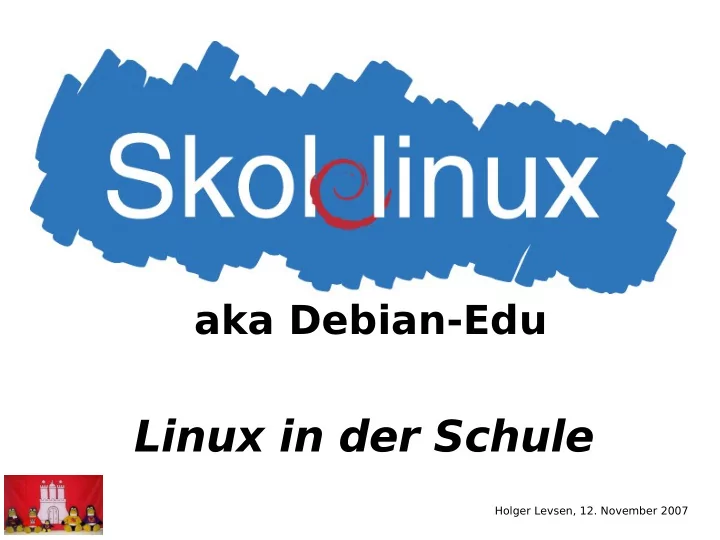

aka Debian-Edu Linux in der Schule Holger Levsen, 12. November 2007
Vorwort ● These slides are written in in english, even though the talk will be held in german. Unless the audience wants it in english ;-) ● Reasons: – easy “recycling” of these slides for me and others. – debian-edu is developed in english. There are local (user) communities too, but our common language is english. ● Zwischenfragen sind gern gesehen, insbesondere wenn ich zuviel Denglisch rede :-)
Outline ● some bits about me ● debian, debian edu ● project goals ● architecture & features ● status of world domination ;) ● development model & tools ● german community ● contributions to Debian ● current and future challenges
Some debian bits about me ● running Debian stable as primary OS since 1996 ● contributing since 2003 ● Debian Developer, holger@debian.org since 2007 – Debian-edu member, powerpc porter, ftpmaster – FAI (fully automatic installation) developer – Debian-QA / piuparts contributor – founded debian-community.org ● DebConf organizer – founded the DebConf video-team in 2005
About the two names... ● nowadays Debian Edu and Skolelinux are used as synonyms – it's the same project ● Skolelinux was started in 2001 in norway, Debian Edu at around the same time in france – skole is norwegian and means school – edu is short for education ● I tend to say that – Debian Edu is name of the project – Skolelinux is the name of the distribution
Debian ● Debian Free Software Guidelines (free distribution, open source, derived works, no discrimination against usage or users, ...) ● Social Contract (will remain 100% free, we will gave back, we wont hide problems, our priority are our users and free software, therefore contrib and non-free) ● > 1000 developers, > 18000 software packages, 12 architectures officially supported ● prominent users: LiMux, LinEx, BSI, HP, LindenLabs (2 nd life), Pixar, Jim Henson, Ubuntu..
Debian Edu and Debian ● official Debian sub-project (and another CDD (Custom Debian Distribution)) ● more than 25 developer gatherings in norway, germany, spain, brazil, france – good to improve cooperation and to avoid flamewars ● approx. 30 debian-edu developers, more than 150 translators and documentation writers ● >1000 debian developers :-) ● 9 packages which are currently not in debian, 11 packages which are modified in debian edu ● goal for lenny: 0 packages differ from debian
Project goals ● The original idea: provide a software distribution with a complete IT platform for primary schools. ● ethical goals: – teach kids that sharing software can be legal and good – teach kids how to tinker and improve the software they use – demonstrate the quality of free software – provide programs on all the native languages (plattdüütsch)
Project goals continued ● practical goals: – reduce the computer-related expences in schools – give schools a well-tested collection of services which reduce system administration needs – increase computer availability
School specific needs ● low maintainance, out-of-the-box setup ● little ressources ● localisation – very important in schools ● learning to express, share & learn ● tools for making music, drawings & learning ● source code availability – to be able to understand whats going on and change it ● different tools for different kind of pupils ● office, java and flash :-( ● -> not so very school specific at all! :-)
Network architecture
Debian Edu “terra 3.0” features ● simplified debian-installer for i386, amd64 and powerpc – architecture specific installation CDs – multiarch DVD ● LTSP server for thin- & half-thick clients ● installed services: ldap, web, mail, remote syslog, cups, ntp, dhcp, dns ● LDAP out the box – user database, home dirs on every machine (via NFS) – web based admintool lwat
More features ● KDE based desktop with java & flash and OpenOffice.org – KDE kiosk mode preconfigured ● complete end-user documentation – developed in a wiki – translated with .po files – generates html and pdf versions ● live-CDs built with debian-live (see http://live.debian.net) ● 3.0r1 coming real soon now
debian-edu in schools worldwide and beyond ● used in more than 450 schools worldwide - mostly europe (300 in .no, 70 in .de) but also more than 60 in africa,distributed via http://fairinternational.org/ ● between 200 and 30000 users per school ● this will at least double in 2008 (LinEx) ● cooperation agreements with Edubuntu, LinEx (Extremadura Spain), KDE-edu, PSL-Brasil, mEDUXa and the UN/MIT project One Laptop per Child
Schools using debian-edu
Development model ● All code, translations and documentation have to be committed to our source code management system(s) ● Bugs have to be committed to the bug-tracking system(s) ● Commit everything upstream. ● Follow the licence-terms, encourage GPL ● Help people to help them selves ● The person who does something decides
Development “tools” ● debian-edu@lists.debian.org ● wiki.debian.org/DebianEdu ● #debian-edu, monthly meetings ● svn.debian.org/debian-edu on Alioth ● ftp.skolelinux.no (we give upload rights to non-DDs – within our policies) ● svn-commit triggered builds of etch and etch-test CDs ● frequent RL gatherings
german community ● Mailingliste: user@skolelinux.de ● #skolelinux.de auf irc.debian.org ● wiki.skolelinux.de ● Testzentrum in Gütersloh ● sometimes/partly disconnected from international efforts – share your needs, work & experience in english ● - LinEx merges too!!
Contributions to Debian ● participation in the CDD effort ● funded kickoff of debian-installer ● preseeding for d-i ● funded kickoff of testing-security ● LTSP ● skilled developers :) ● support the free java and gnash efforts
Current and future challenges ● release “terra 3.0 r1” with improved documentation and lwat ● customisations of the german and french skolelinux teams are only very slowly integrated into debian-edu ● integration of the LinEx customisations, LinEx plans to deploy a new version based on Debian Edu in spring 2008 ● release with Debian Lenny (end of 2008)
Wanna join? ● we need: – developers – testers (general & amd64 & powerpc) – translators – documentation writers – artists – multiplicators – users (teacher, pupils)
Dankeschön :) ● Questions ?
Recommend
More recommend